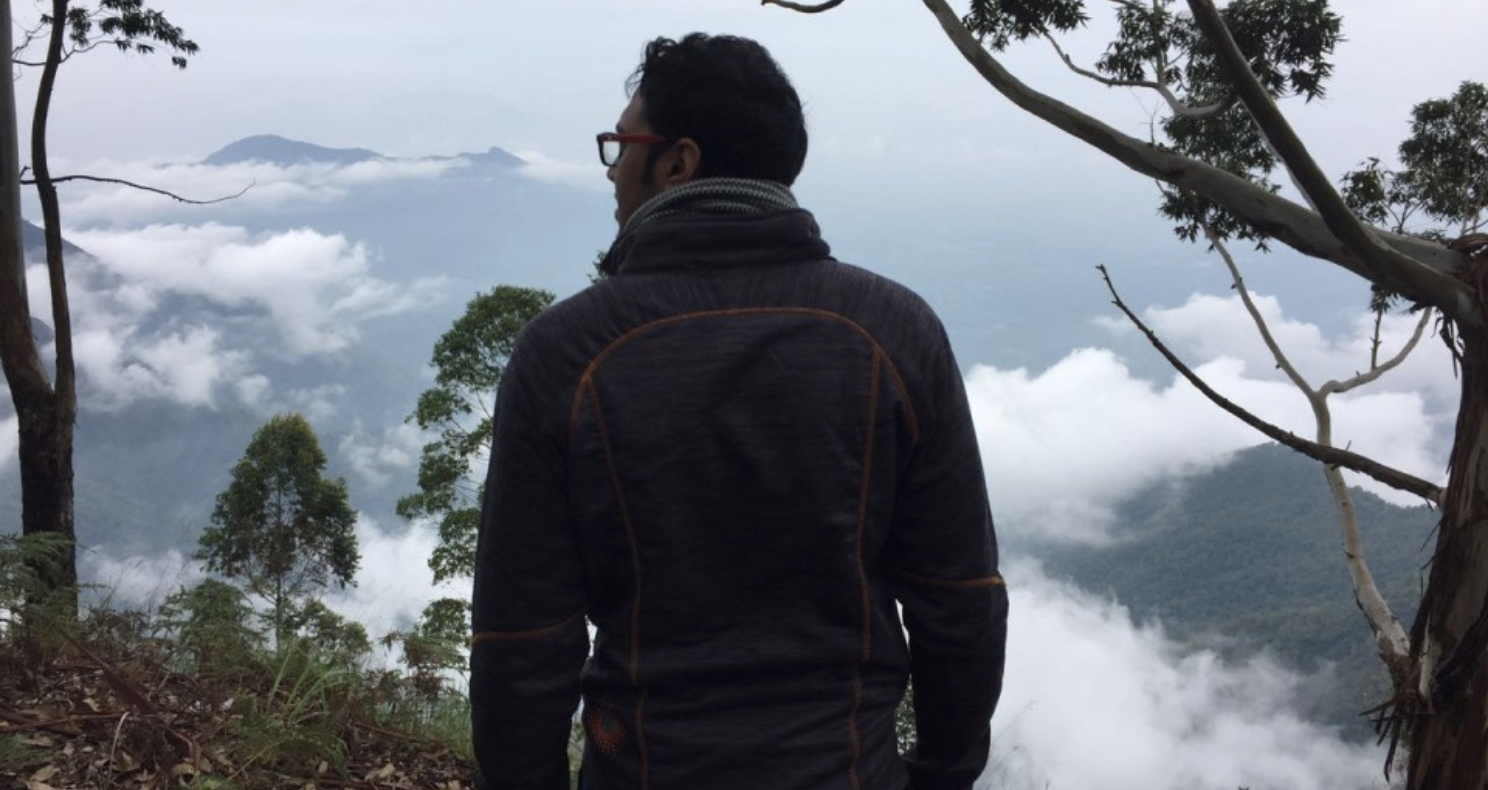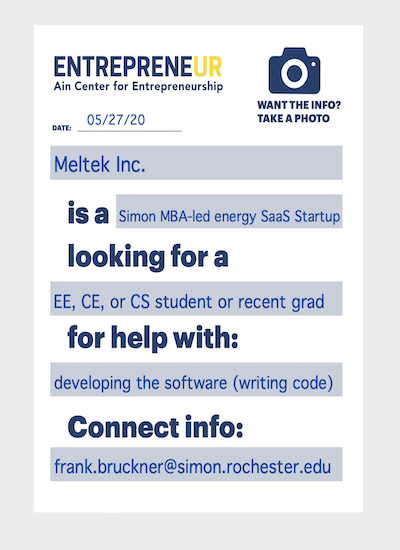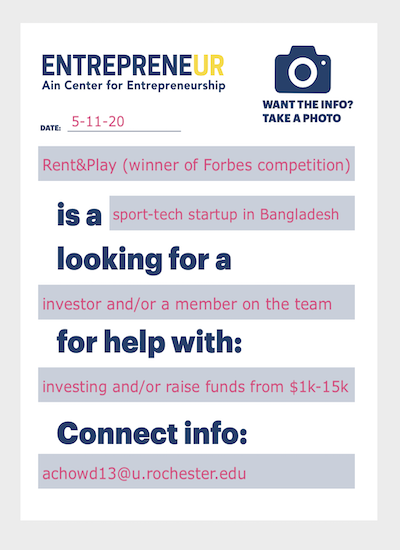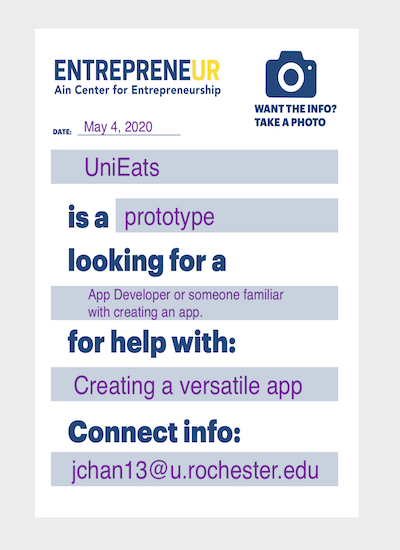Steady Success to Proud Failure
Working on a startup involves long hours, difficult decisions, and a whole lot of learning while doing. After trying his hand as an entrepreneur, TEAM alum Anik Agrawal ’13 (MS) shared lessons from his experience – and also why he has decided to jump into a new venture, even after the first didn’t go as planned.
Steady Success to Proud Failure
Before jumping onto my first startup, I knew that there is a social stigma attached to failure in India. However, being adventurous and somewhat rebellious, I never paid too much attention to that and carried on anyways. After having series of success in life, I experienced my first failure. I am going to share my life story and what I learned from my failure.
Being the only child, the expectations were always high with me as a kid. I was pushed to excel in not just one but all areas of life. I developed a peculiar sense of attitude to not sacrifice on one area of life on the cost of other. When I scored 6th rank in Grade 5, my parents asked why didn’t I come in Top 3. I replied “I am not going to sacrifice my play time just so that you can brag about my rank with other family members and friends.” I was very good with sports. I chose to be right handed while playing cricket but left handed while playing all the racket games. My mother asked me why do I use two hands. I replied “When my right hand gets tired of playing cricket, I will use my left hand to play tennis.”
My father runs a cloth weaving factory in Ahmedabad. I was fascinated by how quickly the machines operated and produced output. This fascination for machines steered me to pursue Mechanical Engineering. During college days, I took part in extra curricular activities like robotics and college fests to engage in social interactions and build self-confidence. I also did an internship in Mercedes Benz which taught me discipline in life. I had to wake up at 4am everyday for 6 months to catch the bus.
Born in a business family, I discovered early on in college that I wanted to do business in long term. I also realized the importance of having a well-rounded job experience that can be applied in the business. I was financed by my family to study abroad and learn a thing or two with the intention that some innovative idea can be brought back to India and converted into a profitable business. Classic Marwadi thinking right!

My 4 years in the US were life-changing. I became over-ambitious and tasted the flavor of success. After pursing my Masters in Entrepreneurship, I landed a job in an early stage well funded startup in San Francisco. Here I was barely 24 years old with an income more than the appetite, living in a dream city. Life could not have gotten any better. The startup saw hockey stick growth that people talked about in entrepreneurship community. Bay area startups had a culture to involve people of all levels in investor/customer meetings. It was a great learning for me and an exposure that shaped me up pretty early in career. About 2 and half years later, I couldn’t resist the idea that if I can be part of a successful startup, why can’t I create one.
This idea led me back to India, as I felt I need to take the first step towards becoming an entrepreneur. I was new to the professional world in India so I decided to get some work experience to understand how things worked. With the experience I had, I easily scored couple of stints of high paying corporate jobs in the span of 2 years. After about 2 years, I was ready to leave all the comfort and certainty of job life and jump onto my first startup.
As you could guess, this where the dark phase begins and after series of success in life, I finally experienced what failure means. I have always seen entrepreneurs talking as if they have figured out everything and that they have a clear vision. But the reality is no one knows the future and I learnt to get very comfortable with the uncertainty of chaos. Another thing which I noticed is entrepreneurs always talked about positive things and impressive numbers, but I learnt that they are just made up. If the numbers were so favorable then 99 out 100 startups would not fail. I learnt how to show the good side but also to be honest at times when things are not working. After spending 2 years building a product, I failed miserably. I had to let go of people who came onboard with a dream I sold to them. I burnt all my savings and lot of my family money. When I think of why I failed, lot of things come in mind but the biggest reason could be my attachment to product. I ignored customer problems and only focused on building a product I thought they need. I have now learnt never to get attached with product and focus only of customer problems.
Here I am not fully recovered from the first blow. I am surrounded by people giving all sorts of free advise like move back to the US, work with a corporate and get a stable job. One thing I have learnt in entrepreneurship is to be persistent and never give up. My failure is only going to be a stepping stone to success. If I steer my direction now and leave entrepreneurship, I might regret this for my entire life.
So I had to give it another shot. With renewed spirit and amazing co-founders, I am back at the grind. I am looking forward to my time at BurnCal. Time to convert dreams into reality!
Anik Agrawal ’13 (MS) completed the TEAM program in 2013. He has since worked in business development positions and founded a software platform to streamline management for companies that install solar energy systems. Anik has recently started a second venture, BurnCal.
Commencements ‘undeniably different’ in the era of coronavirus
The pandemic has taken a toll on every aspect of life, including the usual rites of passage that help us mark time and celebrate accomplishments. Dennis Kessler, Edward and Agnes Ackley Clinical Professor of Entrepreneurship, shared his thoughts on this year’s digital commencement.
Commencements ‘undeniably different’ in the era of coronavirus
By Dennis Kessler (re-published with permission from the Rochester Business Journal)
I’ve told my friends and family for the 20 years that I have been a college professor that my unqualified favorite day of the year is commencement. At the University of Rochester’s Simon Business School, the commencement ceremony is held in the celebrated Eastman Theatre at Kodak Hall; names resplendent of another era. While all commencements are special for the graduates and their families, this one is particularly noteworthy due to the architectural brilliance of the hall and its tasteful elegance richly illuminated by a remarkable multicolored Chihuly chandelier. The inclusion of a sprightly ensemble, courtesy of the university’s distinguished Eastman School of Music performing Sir Edward Elgar’s Pomp and Circumstance, adds conspicuous distinction to the ceremonial character of the event.
Commencement this year will be undeniably different. In fact, acknowledgement of the completion of the rigorous M.S, MBA, and Ph.D. programs at the Simon Business School, known for its quantitative and analytics-based foundations, will merely be acknowledged by the receipt of a diploma delivered via the U.S. Mail. Hardly the tributes merited after years of successful academic study.

This semester, I have 71 students registered for my class: Entrepreneurship 423, New Venture Development. It is a particularly large class as I have nor restriction on the number of students who can enroll in my course. My view is that every aspiring entrepreneur should learn the skills, language, and risk mitigation techniques that I teach which may help turn their innovative dreams into an economic reality. Much of my lecture materials are a collection of experiences, both successful and those less so, as an entrepreneur in the franchise restaurant sector, real estate, publishing and cell tower industries. My hope is that this semester’s lectures, delivered from my home library via Zoom technology, were nearly as effective and impactful as they have been for previous Simon students whose faces and body language I could clearly see and often judge as indicators of comprehension of the material being taught.
Just last week, as the final class lecture and assignments are about due, I received a notice from a student counselor about Damien (fictitious name), a student in my lecture. Damien, a nurse in our University Medical Center’s emergency facility, had applied for “late permission to drop” the course. When I inquired about the reason, the counselor informed me that the stress of the work environment, family responsibilities and demanding MBA curriculum was overwhelming, especially considering the COVID-19 pandemic. I declined to sign the permission to drop form.
After the email exchange with the student counselor, I spoke with Damien in a Zoom session…now the preferred method of communication. Listening attentively, his internal dissonance apparent, I felt compassionate sympathy with his need to drop the course. However, I countered with the reasons why Damien had to preserve toward completion. While I clearly understood the pressures of work, family and a punishing MBA program, he was too close to the finish line to withdraw. This is a course in entrepreneurship, I exhorted. Being an entrepreneur is about overcoming obstacles, about adapting, about risk-taking, agility and determination and how to respond when a severe indiscriminate setback to your routine and finances forces you to swivel in a new direction.
While you are one of America’s heroes on the vanguard of the battlefield in the university emergency room, there is another epic battle waging which is the financial calamity that is destroying our economy, among others worldwide. I submit to you, show your mettle, demonstrate to your colleagues, family and classmates that you can do this, and in fact, as your professor, I will help you in the process. You will be granted an extension on your assignments just as businesses are making concessions for their consumers for late payments. We are all in this together; this is not your fight alone.

As most every American industry is suffering mightily, there are innumerable examples of how American ingenuity and entrepreneurship have responded. The new delivery economy has sprung up overnight spawning Instacart as a household term. The stay-at-home workforce is aided by the new Zoom frontier that many of us are adapting to. While it is somewhat unwieldy, it will improve because entrepreneurs will find a way to make it better or even develop a competing, more refined iteration. Auto dealerships are selling online and delivering to homes in a COVID-19-safe environment. GM and Ford are using their scale to produce face shields and ventilators. Small businesses across the American landscape have adapted to help in the fight. In order to survive, we must adapt. As former Secretary of State Madeleine Albright recently offered in a New York Times opinion piece: “To be human is to be tested over and over, and we usually need abundant help from others.”
As Americans, we will not give up fighting this pandemic. We have moral courage, intellectual competence and resiliency to obliterate this 21st-century plague. This is our authentication of human spirit.
The 2020 graduates of the Simon Business School will remember the commencement they didn’t have. They will also recall how they completed their studies without fanfare, without the customary pose-commencement revelry but indeed, they finished. They, too, will have their day in the sun. They will go on to achieve well-paying positions in industry and elsewhere just as graduates that came before them. They will also recollect how they embraced social distancing, food deliveries, lockdowns, shut-ins, masks, and all the fears inflicted by this insidious virus. They will hopefully also remember that they didn’t give up their dream to finish, on time, in May 2020 with a nascent entrepreneurial idea nourished in ENT. 423, New Venture Development.
Oh, and by the way, Damien has decided to remain in my course. Meliora.
Dennis Kessler serves as the Edward and Agnes Ackley Clinical Professor of Entrepreneurship at the University of Rochester’s Simon Business School.
To learn more about this year’s commencement and degree conferrals, visit the University of Rochester’s Celebrating the Class of 2020 webpage.




